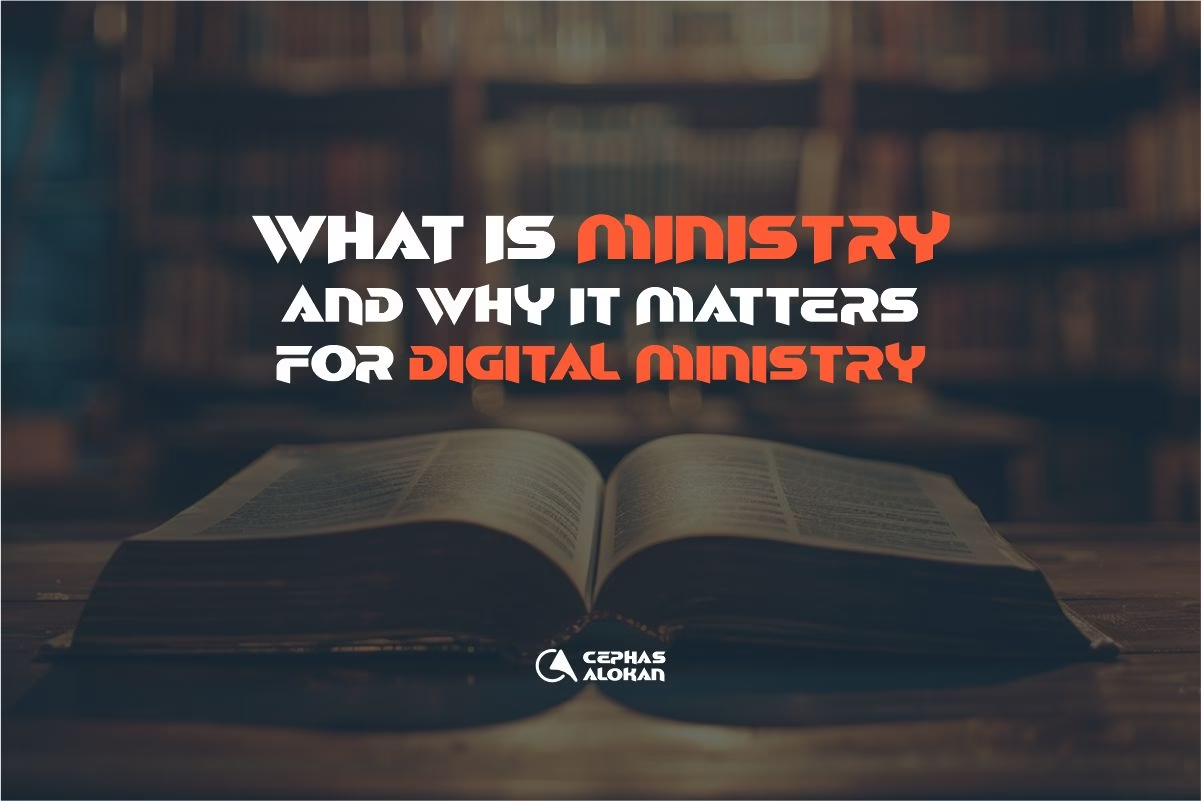In my journey through the digital world, I’ve encountered numerous individuals who describe their efforts as “digital ministry.” Yet, each time I attempt to understand their activities, they often fall short of aligning with the biblical definition of ministry.
We need to recognize that before we can truly engage in digital ministry, we must first understand the essence of ministry itself. Ministry, as defined by Scripture, is not merely an activity carried out because one possesses certain skills or digital expertise. It is a sacred calling, grounded in service unto God and to people, the proclamation of the Gospel and the edification of His people.
Digital ministry, therefore, should be an extension of this foundational understanding. It’s not just about leveraging technology because it’s available; it’s about using it to advance the core mission of ministry. We must ensure that our digital efforts are not divorced from the true purpose of ministry but are instead deeply rooted in it.
Understanding the biblical definition of ministry helps us grasp the true concept of digital ministry. It guides how we use digital tools and platforms to serve others, spread the Gospel, and reflect Christ’s love and teachings in every interaction. Our digital endeavors should flow from a place of genuine ministry, ensuring that they honor and align with the core values and purposes set forth in the Scriptures.
The Meaning of Ministry and Its Biblical Usage
The Greek term for ministry is diakonia, derived from diakoneo, which translates to “to serve.” This foundational concept encapsulates the essence of ministry.
Mark 10:44-45 (NIV): “And whoever wants to be first must be slave of all. For even the Son of Man did not come to be served (diakoneo), but to serve (diakoneo) and to give his life as a ransom for many.”
John 12:26 (NIV): “Whoever serves (diakoneo) me must follow me; and where I am, my servant (diakonos) also will be. My Father will honor the one who serves (diakoneo) me.
Acts 6:1 (NIV): “In those days when the number of disciples was increasing, the Hellenistic Jews among them complained against the Hebraic Jews because their widows were being overlooked in the daily distribution (diakonia) of food.
2 Corinthians 5:18 (NIV): “All this is from God, who reconciled us to himself through Christ and gave us the ministry (diakonia) of reconciliation.” This verse highlights the ministry of reconciliation given to believers.
Ephesians 4:12 (NIV): “To equip his people for works of service (diakonia), so that the body of Christ may be built up.” This verse refers to the role of church leaders in preparing the members for acts of service.
Meaning of Ministry
At its core, ministry is about being called to serve God and others. It encompasses the use of one’s gifts, time, and resources to advance God’s purposes and to minister to His people. While ministry is often associated with traditional roles within the church, such as pastoral or teaching positions, its scope is far broader.
Ministry includes a calling and any act of service that aligns with God’s will and promotes His kingdom. It involves a willingness to meet the needs of others, demonstrate compassion, and act selflessly. This can be done through sharing the Gospel, discipling people, or supporting others in their spiritual journey, ministry reflects the heart of service as exemplified by Christ.
In the biblical context, ministry is not merely a function or a set of duties; it is a lifestyle of devotion and service. It requires humility and a genuine commitment to both God and people. Every act of service, when done with a heart aligned with God’s will, constitutes ministry.

Stages of Ministry and the Calling of a Believer
- Great Commission: The Great Commission, found in Matthew 28:19-20, directs believers to evangelize and disciple nations:
“Go therefore and make disciples of all nations, baptizing them in the name of the Father and of the Son and of the Holy Spirit, teaching them to observe all that I have commanded you.” (Matthew 28:19-20, ESV)
This command emphasizes the global and inclusive nature of ministry, calling believers to spread the Gospel and nurture spiritual growth across cultures and nations.
- Ministry of Reconciliation: 2 Corinthians 5:18-20 describes the ministry of reconciliation, which involves bringing individuals back to God:
“All this is from God, who through Christ reconciled us to himself and gave us the ministry of reconciliation.” (2 Corinthians 5:18, ESV)
This ministry is vital for all Christians, as we are all called to the ministry of reconciliation. Just as we have been saved, we are also called to seek the salvation of others. This aligns with God’s mandate for us as His children to go into the world and preach the Gospel to all creation.
- Specific Ministries: The New Testament outlines specific roles and gifts for ministry:
- 5-Fold Ministry: According to Ephesians 4:11, some are called to be Apostles, Prophets, Evangelists, Pastors, and Teachers. These roles guide and equip the church for service and growth:
“And he gave the apostles, the prophets, the evangelists, the shepherds and teachers,” (Ephesians 4:11, ESV)
- Romans 12: Lists various gifts and ministries, including serving, teaching, and leading, illustrating the diverse ways believers can engage in ministry:
“Having gifts that differ according to the grace given to us, let us use them.” (Romans 12:6, ESV)
This is special because it requires both a calling and gifts for His service. God is calling many people into ministry, not limited to the fivefold ministry. Digital ministers are among those God has called to stand in the digital world and preach the Gospel.
Ministry and Service
True ministry is fundamentally defined by its service unto God. As highlighted in 1 Peter 4:10, ministry is inherently tied to the use of our gifts for the benefit of others:
“As each has received a gift, use it to serve one another, as good stewards of God’s varied grace.” (1 Peter 4:10, ESV)
This scripture underscores that ministry is not merely about performing tasks or engaging in activities but is about serving others according to God’s will. The essence of ministry lies in our commitment to use our gifts and resources to benefit others and to glorify God.
If an activity does not align with serving God or others in a manner consistent with His will, it falls short of being classified as true ministry. Effective ministry requires more than just outward actions; it demands a genuine and purposeful commitment to serving others with the heart of Christ.
How Do We See Digital Ministry from Here
We have established the core principles of ministry, but how do we view digital ministry through this lens? As digital tools become increasingly accessible, it’s vital that digital ministry reflects the core values and purposes of ministry. Here’s how understanding ministry impacts digital practices and why it matters:
Reflecting Ministry Values in Digital Ministry
- Purposeful Engagement: Digital ministry should mirror the intentionality of ministry. Every online interaction, content piece, or outreach effort must have a clear purpose aligned with advancing God’s kingdom. As discussed, digital efforts should aim to serve and uplift others spiritually, not merely create a digital presence. Colossians 3:23 underscores this approach:
“Whatever you do, work heartily, as for the Lord and not for men.” (Colossians 3:23, ESV)
- Authentic Service: Digital ministry must focus on genuine service rather than superficial engagements. The use of digital tools should stem from a heartfelt desire to serve God and others, not just leverage technology. Galatians 5:13 reminds us of the importance of serving one another in love:
“For you were called to freedom, brothers. Only do not use your freedom as an opportunity for the flesh, but through love serve one another.” (Galatians 5:13, ESV)
- Consistency with Biblical Teachings: Just as ministry is rooted in biblical teachings, digital ministry should reflect these same values. Content and interactions must align with Scripture, promote spiritual growth, and reconcile people to God. 1 Timothy 4:16 highlights the importance of adhering to sound doctrine:
“Keep a close watch on yourself and on the teaching. Persist in this, for by so doing you will save both yourself and your hearers.” (1 Timothy 4:16, ESV)
- Aligning Activities with True Ministry: Digital tools alone do not constitute digital ministry. Activities conducted through these platforms must align with the true definition of ministry. Engaging in digital ministry requires that efforts genuinely serve others and further God’s work, rather than simply using technology for its own sake. Matthew 20:28 highlights the essence of service:
“Even as the Son of Man came not to be served but to serve, and to give his life as a ransom for many.” (Matthew 20:28, ESV)
- Avoiding Superficial Digital Presence: Those skilled in digital tools should not claim to be engaging in digital ministry if their efforts do not meet the criteria of genuine ministry. Digital ministry must be grounded in the same values and purposes as defined ministry. Without this alignment, digital activities risk becoming superficial or disconnected from their intended spiritual impact.
The Necessity of Rooted Values
The values of ministry must be deeply embedded in any digital endeavor. The effectiveness of digital ministry hinges on its ability to reflect these core principles:
- Service to God and Others: Every digital effort should reflect a genuine desire to serve God and others authentically, aiming for spiritual enrichment and community building.
- Purposeful Content and Interactions: Digital content and interactions must be purposeful, advancing God’s mission and supporting individuals’ spiritual journeys.
- Consistency with Biblical Principles: Digital ministry should align with biblical teachings, ensuring that every digital activity promotes sound doctrine and spiritual growth.
Conclusion
Digital ministry is not merely about the passion or skillfulness of technological practices; it is about understanding that it is an avenue to genuinely serve God and people for reconciliation and edification.
Every online activity must be evaluated to see if it aligns with this definition. If it does not, it may not truly be digital ministry.
Take a moment to examine what you are currently doing and ask yourself: Is it truly digital ministry?






